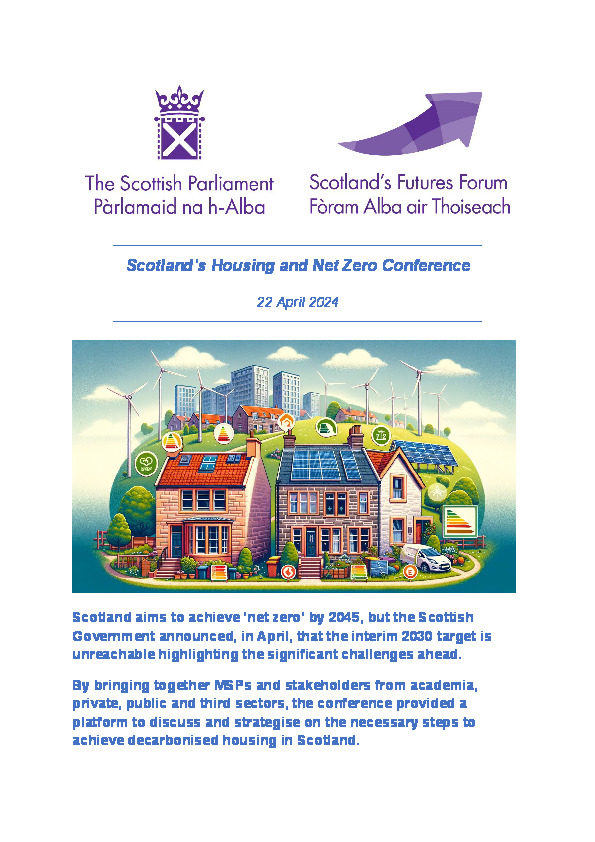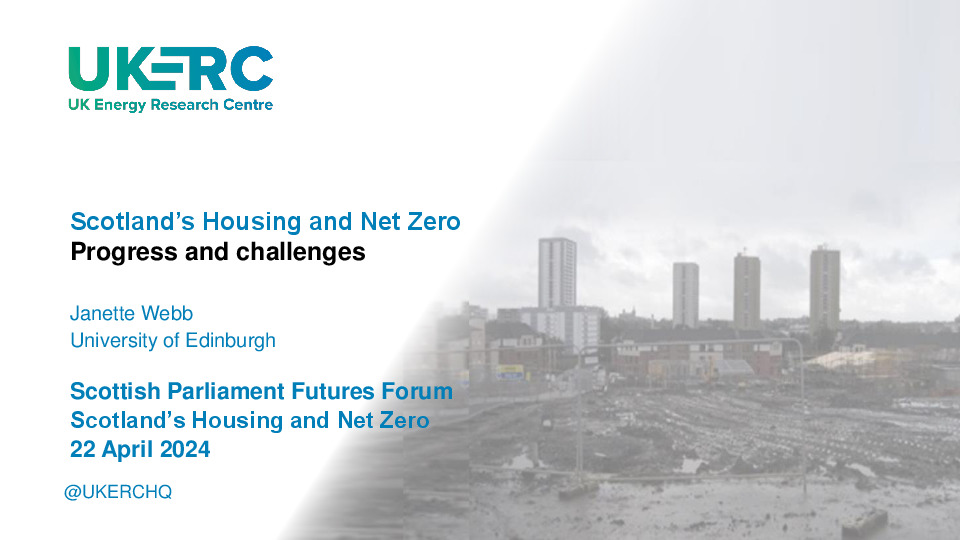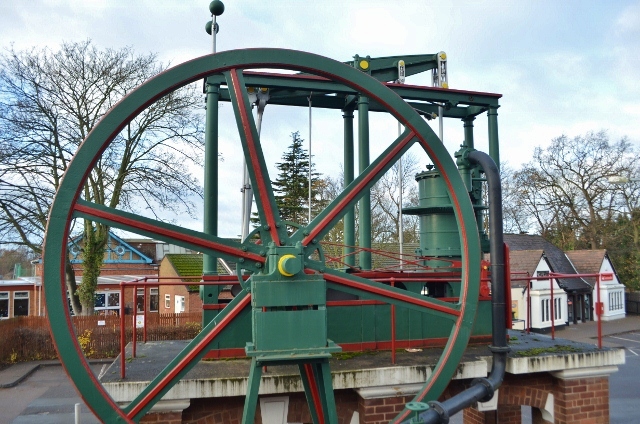Scotland’s Housing and Net Zero Conference
22 April 2024
Scotland aims to achieve ‘net zero’ by 2045, but the Scottish Government announced, in April, that the interim 2030 target is unreachable highlighting the significant challenges ahead.
By bringing together MSPs and stakeholders from academia, private, public and third sectors, the conference provided a platform to discuss and strategise on the necessary steps to achieve decarbonised housing in Scotland.
Introduction
Tackling the carbon emissions created by our housing – which account for 13% of our total emissions – is crucial. Delivering clean heating systems and warm homes is difficult, especially for old tenement buildings and in rural areas. Several local authorities in Scotland have declared housing emergencies. Housing providers face a dilemma between addressing rising house prices and the shortage of affordable homes – giving people a home – and reducing carbon emissions from existing housing stock.
Those important issues are set against a backdrop of challenging finances for local and central government and the wider Scottish Government policy, including its ‘Housing to 2040’ strategy and the fourth National Planning Framework implemented in 2023. In addition, the costs of construction have increased, exacerbated by skills gaps in the workforce.
This Futures Forum conference, held in partnership with the Scottish Parliament’s Local Government, Housing and Planning and Net Zero, Energy and Transport Committees, allowed members to meet and hear from a wide range of stakeholders discussing overcoming barriers to decarbonising buildings. Both Committees expect to scrutinise the Scottish Government’s draft Climate Change Plan. The Local Government, Housing & Planning Committee also anticipates a role in scrutinising the proposed Heat in Buildings Bill.
Format
Opening remarks from Esther Roberton, Director of Scotland’s Futures Forum, and Edward Mountain MSP, Convener of the Scottish Parliament’s Net Zero, Energy and Transport Committee, were followed by presentations from:
- Patrick Harvie MSP, Minister of Zero Carbon Buildings, Active Travel and Tenants’ Rights
- Professor Janette Webb, Edinburgh University Professorial Fellow in Social Studies of Energy and UK Energy Research Centre Co-Director
- Dr Richard Lowes, Senior Associate at global clean energy policy NGO the Regulatory Assistance Project
In workshops, attendees explored issues around retrofitting, decarbonising buildings, and the wider socio-economic implications of delivering change. These were facilitated by:
- Professor Janette Webb
- Dr Jamie Speirs, Reader and Deputy Director in the Centre for Energy Policy at Strathclyde University
- Professor Ken Gibb, Professor in housing economics at the University of Glasgow
The event concluded with a panel discussion and Q&A.
Key messages
- The Scottish Government is attempting to address a collective problem by placing too much emphasis on individual actions. While individual efforts are important, the scale of change needed requires community-led and collective solutions, supported by local authorities to ensure inclusivity. A major challenge in achieving this is our society’s focus on individualism over community.
- Scotland’s housing system is complex, with diverse tenures and an ageing, tenement-based housing stock. A one-size-fits-all approach to decarbonisation is not practical. Policies must be tailored to different tenures, property types and geographical locations, grounded in the science underpinning decarbonisation, and delivered by detailed planning. Social housing providers are leading and innovating in this area, as they have greater control over their housing stock.
- Public buy-in is essential to achieving the necessary scale of change for decarbonisation. Currently, the narrative around decarbonisation and retrofitting is dominated by negative media stories and misinformation. The Scottish Government needs to improve its communication by making it accessible and inclusive, while also building a vision that resonates with the public. We can learn from the examples of other European countries, such as the Netherlands, which successfully achieved broad public support for banning gas boilers.
- Scotland relies heavily on mains gas for heating. The Scottish Government must advocate for energy market reforms by the UK Government, specifically to decouple the pricing of electricity and gas. This would help mitigate future costs increases when demand for electricity rises.
- Transforming Scotland’s housing stock is estimated to cost £33 billion. This significant expense can be addressed through various actions, such as amending the tax system to encourage investment, including modifications to the Land and Buildings Transaction Tax. Other measures include maximising the visibility and distribution of individual grants, encouraging households to allocate part of their estimated £22 billion annual home improvement spend towards retrofitting, making green mortgages more competitive and increasing the use of clean heat discounts from energy suppliers. Additionally, it is crucial to unlock private capital and engage big business in this transformation.
- Market certainty is essential, and this can be achieved through consistent Scottish Government policy and legislation, including the timely passage of the proposed Heat in Buildings Bill. Currently suppliers bear most of the risk in meeting the up-front costs of heat pump installations, and they need incentives to develop these schemes. Additionally, tradespeople play a crucial role in educating consumers and their influence should be recognised and harnessed to support people in making necessary changes.
- Existing technologies, such as air source heat pumps, need to be demystified to encourage wider adoption. Heat networks and energy efficiency improvements will be central to the achieving net zero in Scotland’s housing stock.
- The scale of the challenge is immense. To meet national targets, we need to increase the rate of retrofitting from 5,000 homes a year to 100,000 each year. History shows though that rapid change is possible with national leadership and collective action.
Keynote speech
Patrick Harvie, Minister for Zero Carbon Buildings, Active Travel and Tenants’ Rights
The Minister emphasised that Scotland is at a pivotal moment in tackling the climate challenge, particularly in the rapid decarbonisation of home heating. He stressed that this transition must consider the structure of the housing sector and be executed in a socially just manner that upholds everyone’s human right to a home.
Defending the Scottish Government’s housing delivery track record amidst capital budget cuts he highlighted several initiatives. These include a Housing Bill proposing increased tenant protections and actions that have brought over 9,000 empty homes back into use since 2010. From 1 April 2024, new regulations will require the installation of clean heating systems, such as air source heat pumps, in all new buildings. Plans for a Heat in Buildings Bill will also mandate clean heating installations and revise energy efficiency standards for all buildings. Additionally, the Scottish Government intends to legislate for ‘passivhaus’ standards for homes by the end of the year.
Mr Harvie pointed out that the transition to net zero presents opportunities for job creation in Scotland. He highlighted the importance of innovation and investment noting that the Green Heat Finance Taskforce is exploring funding options for the green transition, including green mortgages alongside existing grants. The Minister underscored the need for clarity for business and industry on future regulation from the Scottish Government.
The Minister also stressed the importance of securing public buy-in for these necessary changes, to combat media misinformation and negative lobbying by vested interests. The Scottish Government plans extensive engagement efforts with individuals, local authorities and businesses to facilitate the heat transition.
Presentations
Professor Janette Web: The current position in Scotland
Professor Janette Webb’s presentation outlined the current position and challenges in Scotland. To meet the Scottish Government’s targets approximately 100,000 homes would need to be retrofitted each year, but numbers currently stand at just 5,000 a year. She outlined how the current model of change, where individual home owners take action, is not working. Contractors cannot get their costs per household down sufficiently when working with just one household at a time.
The tenure of many buildings in Scotland creates challenges, with buildings often having multiple owners including both owner-occupiers and landlords who need to reach agreement on what retrofit action should be taken. Other countries in Europe typically have much more cooperatively owned housing, making it easier to carry out retrofitting. Privately owned homes tend on average to have lower energy efficiency standards.
These challenges highlight the need to look at supporting community action at a neighbourhood level rather than individually, enabled by local authority funding. However, Scottish society talks more about ‘consumers’ than ‘citizens’, illustrating how individualised Scotland is.
Scotland also remains very reliant on the established methane gas grid, and people’s expectations of warm homes has changed too in recent generations. A strategy for change needs to take this into account and be led by the importance of how a warm home makes people feel.
Professor Webb said that history shows that change can happen quickly – as with Scotland’s previous conversion from a reliance on coal gas to mains gas supplies. But a decade of delay has made the challenge harder, and more expensive, ‘doubling the misery’.
The cost of transforming Scotland’s housing stock is estimated to be £33bn. Professor Webb recognised how high that figure is, but also noted that there are ways of enabling it to happen through challenging the allocation of existing spending or exploring tax reform (such as with a Green Land Value Tax). She noted that the public spends approximately £22 billion per year on home improvements – could we encourage people to redirect some of that towards retrofitting, supported by subsidies?
Dr Richard Lowes: the international perspective
Dr Richard Lowes provided some examples of what action is being taken in other countries to tackle emissions from housing, stressing that heat pumps are the key technology which will make the biggest difference in Scotland. Our use of gas heating is relatively high internationally, at 80% of all homes. Heat networks and energy efficiency are also central to the global buildings transition in the coming years.
In the Netherlands, gas boilers will be banned after 2026, and the government there has succeeded in getting industry on board, accompanied by broad public support which was developed through ongoing discussion over the last decade. Persuading the public has been important, and that has been an organic process.
In Germany a ban on boilers was implemented from January 2024, but without public discussion beforehand there was a significant backlash and the government has since watered down its proposals. Germany has less than half of its homes connected to the gas grid, far fewer than in Scotland.
In France, 600,000 heat pumps are being installed every year, and this is seen as being the minimum needed to meet their target. Heat pumps are becoming normalised, and the government has mandated that those should be manufactured in Europe, preferably in France.
In the US, more heat pumps are sold than boilers, which partly reflects their use there for cooling as well as heating, and for dehumidifying buildings. That is a localised picture though which varies across states.
Workshop discussions
Workshop 1: Decarbonising Heating
Dr Jamie Speirs facilitated a group discussion around what actions should be prioritised in Scotland to take forward decarbonising heating, given the constraints there are on both time and resources.
Dr Speirs suggested there were different areas to consider:
- Public attitudes and engagement, including the likely levels of disruption to people and their concerns about that
- Economics and who pays, including supply chains, and the balance of electricity and gas
- Technological, such as heat pump performance. Currently, targets are set around technologies which already exist, but should we also be thinking about new developments and innovations?
The summary below of the discussion that followed has been structured around those three key areas.
Public attitudes and engagement
- Public buy-in to the importance of decarbonisation is key, and language is important to the success of that. Currently much of it is negative, talking about prohibition (such as removing gas boilers) rather than opportunity
- The need to raise public awareness was deemed vital but it was also recognised that the time available for that was limited. It was thought technology like heat pumps needs to be demystified
- Communication is currently shaped by mass media, in particular negative stories about heat pumps, and it is important to counteract this
- Questions were put on how people could be encouraged to retrofit when undertaking other work in their homes
- Contractors carrying out work are often a trusted source of information, and this should be capitalised
Economics and ‘who pays?’
- It was highlighted that the Scottish Government’s key role should be influencing the UK Government to decouple the pricing of electricity and gas
- Without that, the UK won’t necessarily achieve the gains in decarbonisation that other countries will. The price of electricity needs to reduce in relation to gas, and/or gas needs to be made more expensive through a fossil fuel levy. Currently the tax system does not encourage action, and the market does not reward carbon friendly behaviour. Whether there was time to accelerate taxation on gas was discussed
- The group discussed the advantage of area-based approaches and collaboration in bringing down costs. However, at an individual level the roll-out of grants needs to be maximised and made more visible as in the near-term it will build demand, and help decarbonising homes to become the social ‘norm’. There does though need to be more data about how effective the Home Energy Scotland grant scheme is
- Demand can also be built through building in requirements at the point a property is purchased
- Currently the median cost of installing a heat pump in a home is £15k, but there needs to be better data and greater transparency, particularly about running costs. Those costs can be re-balanced, with some supply companies reducing their tariffs and providing clean heat discounts. Suppliers need to be incentivised to develop installation schemes; currently they take most of the risk in meeting up-front costs. Suppliers could also take action to reward carbon friendly heating such as discounts for powering a heat pump
There were calls in the workshop for the Scottish Government to provide market certainty and for the Heat in Buildings Bill to be introduced as soon as possible.
Technology
- Should we focus on making the most of the tools we already have, such as heat networks, where there has been a low level of discussion about their use to heat existing building stock? Local government’s key role could be in the building the use of heat networks, enabling planning decisions and permissions. Early progress on licensing heat networks provides certainty for developers
- Energy demand reduction is important – not just decarbonising the energy we do use. The cost of implementing the new-build heat standard is about £7k per home, leading to an increase in capital mortgage costs but it can be scaled up at pace. There may be better ways of delivering the Passivhaus standard
- Implementation mechanisms need to be planned. The example was provided of the west coast of Denmark where heat pumps will be used collaboratively, and opportunity taken to balance the heat used with the power produced, with electricity being taken when it is over-produced
Workshop 2: Retrofitting existing housing stock
Professor Ken Gibb facilitated the workshop on retrofitting, preceded by introductions from Ariane Burgess MSP, Convener of the Local Government, Housing and Planning Committee.
Professor Gibb provided an outline of the key issues from his perspective as a housing researcher and an economist. He noted that there is a risk that housing is treated in too simplistic a way, instead of recognising the significant complexities of the housing system. It requires large amounts of state intervention, and of course is everywhere and effects everyone.
Retrofitting presents a cultural challenge, because of the need for collective solutions, and it also requires a systems-wide approach which incorporates complex science and planning.
The existing housing stock dominates what is needed to be done to meet net zero, and we need to find the most effective leverage points. Different tenures are progressing with retrofitting at different rates, with social housing innovating and taking risks, paid for by the rents they receive. Social landlords have the advantage of a greater degree of control and can therefore drive change.
The group moved on to discuss what actions should be prioritised to retrofit Scotland’s housing stock, given the constraints on time and resources. A summary of the main points which were raised is provided below.
- Policy should be targeted at different types of tenure (for example private or social rented sectors). Around 40% of buildings have mixed tenure which creates particularly challenging logistics, with delays caused by the need to obtain consent from all residents. Mandatory owners’ associations are needed, and it was noted that the Scottish Law Commission is currently exploring this. We need better data on both buildings and on people to understand the leverage that exists to help steer residents through the process and identify and tackle barriers. We should draw on the experience of housing associations in this
- However, we don’t yet share data on retrofitting different types of housing, for example how heat pumps might work for them. Flatted developments should be treated differently from more traditional housing
- Energy efficiency shouldn’t be looked at in isolation – for example tax can have a major impact, such as the Land and Buildings Transaction Tax creating high upfront costs for landlords investing in the market
- There is a need for community led and collective solutions, rather than focusing on individuals, so that no-one is left behind. Retrofitting should be invested in at scale and actioned at pace. The necessary skills will only come once businesses see the benefit of investing. Larger, area-based projects gain momentum as people start to see the benefits their neighbours have gained and are reassured about the costs and benefits in local supply chains
- It was argued that there should be a switch from repairing properties to a focus on more energy efficiency
- The system needs to react more quickly to new technology, such as new methods of heat storage and other models
- There should also be a quicker response to ban products that are not effective. For example, underside roof sprays used for insulation which can be ineffective and dangerous, and there is a lack of guidance on their use
- Communication from the Government needs to be improved, given that public understanding is key. The recent example of public confusion around wood-burning stoves was cited, as was the misconception about the purpose of 20-minute neighbourhoods
- Changes need to be made attractive to residents, such as potential cost savings or tax breaks. There are different drivers for residents and landlords etc, but education is key to everyone given misinformation and lack of awareness are both problems
- There are opportunities to carry out retrofitting when other works are taking place, but often these aren’t taken up. The example was provided of local authorities repairing or replacing roofs but not taking the opportunity to install solar panels, probably due to the cost involved. Similarly, how do we ensure a cultural shift takes place so that some of the £28bn which households spend on home improvements is re-directed to retrofitting?
The group then discussed who should be responsible for those actions, and how they could be funded, beginning with the recognition that there is no single mechanism to do that.
- There is a potential route through the Land and Buildings Transaction Tax by providing significant rebates (for example 50%) for people who retrofit homes. The Chartered Institute of Building has done some work on this in the Irish context
- Existing budgets need to be spent efficiently, with economies of scale. There must be improved access to existing funding so that it doesn’t go to waste
- Green mortgages need to be more competitive – currently there is little incentive as the deals available aren’t as good
- We need to leverage big business (for example pension funds) into action – currently we are too focused on smaller businesses. We need to unlock private capital. The Scottish National Investment Bank wants to find businesses to invest in
- We must ensure that everyone benefits from warmer energy efficient homes, not just the better off, and incentivise people on lower incomes to act
- We should target the least energy efficient properties first, at the point of sale – there are huge outlays when someone moves home, and there is a need for impartial advice and brokerage
- Better collaboration and coordination with the UK Government is needed
- Recognition that there is sometimes a strong case for re-building instead of retrofitting, which can take four times the carbon budget, is also needed
Workshop 3: Socioeconomic considerations
Following an introduction by Willie Coffey MSP, Professor Jan Webb provided an outline of what she views as the key issues, before going on to facilitate the group’s discussions.
- Professor Webb posed the question of what is meant by ‘socioeconomics’ – these can include finances, the supply chain, people’s sense of personal security and the part they play in acting. She noted that there is some Scottish Government funding already available, such as the Social Housing Net Zero Fund, and the Green Heat Network Fund, with currently around £600m of those funds uncommitted. Private finance remains in the early stages
- Policy and regulatory measures are also important, along with grants and loans
- Public engagement is vital, and an understanding of the heat transition
- The gas grid remains dominant in Scotland, and there are ongoing debates around the feasibility of conversion to hydrogen
The group then went on to consider how we can meet net zero goals while tackling a housing crisis and fuel poverty, and where there may be economic opportunities created by the shift to net zero that could help tackle the housing crisis. A summary of their discussions is provided below.
- Scotland needs to seize opportunities presented by the transition to net zero (such as opportunities associated with from marine energy). An example was provided of one village’s significant income from a wind-farm (£2m) which was enabling them to set up energy advice and fund for local households
- We need to maximise and articulate the opportunities and benefits of the transition and build a vision people can buy into. Significant public investment and interest is needed – along the lines of ‘Operation Moonshot’ in the US in the 1960s – and we need to demonstrate the benefits that could be created by public investment
- Scotland’s mixed tenure is a challenge – who for example could coordinate retrofitting in one street? Local community drive is needed. What role do councils have in that, who could lead it and provide help? What would be the mechanism to get communities together?
- Housing Associations are tackling this and carrying out good retrofitting programmes, but there are many problems such as managing tenement buildings and the pressures on ongoing maintenance, and so they need to be pragmatic whilst looking to the future. They can’t do it on their own with current levels of funding, and so there is a nervousness in the sector
- It’s vital that we tackle the housing challenge and homelessness at the same time as net zero
- Policy coherence is also needed to consider wider aspects e.g., incomes in context of fuel poverty. Energy debt physically harms people, and we are causing failure demand for the future. The social security system is broken, and a minimum income guarantee could be the key. It was also noted that many people in fuel poverty already live in a property with a C energy efficient rating therefore improving energy efficiency isn’t necessarily the only response to addressing fuel poverty
- Everyone is invested in the climate crisis and there needs to be an accessible and inclusive conversation. For example, we are currently not bringing disabled people into the conversation
- We must remember the volatility of energy markets, which mean that the cost of clean heating (electricity) could increase, making it more expensive than gas heating. We need to look more at metering energy usage. There is little research into the unintended consequences of retrofitting/clean energy
- It was noted that the current energy cap on prices does not apply to district heating systems
- There needs to be consistency and certainty in policy decisions – earlier schemes for decarbonisation were in place but the funding available changed
- The current spend by households on home improvements (£22 billion per year) presents an opportunity – we need to help people think about directing some of that spend to clean heating and retrofitting
- There is a need to find synergies with other priorities that the private sector is engaged in. For example, there may be legacy benefits of net zero such as rural housing for the ‘net zero’ workforce, that could be made available for local housing need once the employees are no longer needed in that area
- The Scottish Government is currently trying to make a collective problem one for individuals. Choices need to be made nationally instead, for example, with a phased approach that limits choice about when action happens
- Local Heat and Energy Efficiency Strategies can help deliver a community response supported by local authorities
- Power needs to shift back to communities and away from Parliament, learning from the examples of the communities on the islands of Canna and Eigg
Panel discussion and Q&A
Panel members:
- Ariane Burgess, MSP
- Professor Ken Gibb
- Dr Richard Lowes
- Edward Mountain, MSP
- Dr Jamie Speirs
- Professor Janette Webb
Following the workshops, the facilitators of each one joined a panel discussion, joined by Dr Richard Lowes, Ariane Burgess, MSP and Edward Mountain, MSP. Ariane Burgess chaired the discussion, which began with each facilitator providing a summary of some the main points discussed in their workshop.
Workshop 1: Decarbonising Heating
Dr Jamie Speirs noted that the group highlighted the need to make the most of the tools and technologies that we already have and to de-couple gas and electricity pricing. Greater public awareness and communication is needed so that people hear from trusted voices. A ‘consumer journey’ is required, but there is scepticism that we have the time to do the work that has taken place in other countries. The group recognised the challenges faced by local government.
Workshop 2: Retrofitting
Professor Ken Gibb explained that not enough use is being made of data about buildings and about what people want or already know. The group discussed the challenges of collectivism vs individualism, the need to use tax more creatively to encourage action, and the challenges presented by Scotland’s mixed tenure buildings and in particular tenements.
Workshop 3: Socio-economic considerations
Like the other workshops, this group explored the need to move away from an individual approach and the need for more hands-on governance to address change. There is value in local and community-led initiatives, and work with third sector organisations. Local Heat and Energy Efficiency Strategies produced by local authorities can be built upon.
The audience was then invited to put questions and discussion points to the panel, summarised below.
Heat in Buildings Bill
- Compliance with energy efficiency and clean heating requirements are all necessary, and rule changes matter to changing behaviour. But at the same time there is a need to support people to change, and it will be important to avoid the risk of ‘box-ticking’ to meet requirements
- Could there be consequences for the housing market? There needs to be due diligence carried out for the policy change
- Regulation is inevitable, but typically there is mass deployment beforehand, with regulation only used for the final phase of change. There is the risk of people seeing no personal benefit; currently the system isn’t smooth for accessing grants and loans, and we can’t expect all households to find £7k for installing heat pumps. It needs to be ‘slicker’, as with the UK Boiler Upgrade Scheme
Retrofitting and Energy Performance Certificates
- There shouldn’t be a ‘one-size-fits-all’ approach to EPCs, and there are issues about the accuracy of EPC rates
- Targets and milestones need to be set for the number of properties to be retrofitted. It’s important to establish who is responsible, in particular what the role of local authorities will be
- How best can property owners and social landlords be incentivised to take action? Effective communications will be vital, otherwise there will be mass protests. People haven’t heard of Energy Efficient Scotland or the Heat in Buildings Bill
- So far there has been a very theoretical approach – this needs to shift to being practical about what can be delivered to people’s homes. For example, tenement buildings should have effective double glazing and internal wall insulation
Speaker biographies
Professor Ken Gibb

Kenneth Gibb is a professor of housing economics at the University of Glasgow where he directs the ESRC UK Collaborative Centre for Housing Evidence. Current research interests include rent control, supporting more affordable housing supply, housing retrofit, housing tax reform and systems thinking applied to housing. Ken is a trustee and board member of the What Works Centre for Homelessness Impact, he is on the board of Clyde Valley housing association and the committee of Shelter Scotland. Ken chairs the Scottish Government short life working group on the meaning of affordability and is a member of the Scottish Government’s housing investment task force.
Dr Richard Lowes

Richard Lowes is a specialist in the technology and policy associated with heating. He is a Senior Associate at global clean energy policy NGO the Regulatory Assistance Project where he leads much of RAP’s European and global work on heating. He joined RAP in 2021 with over 10 years’ heat policy experience in industry, academia and working with policymakers. He previously worked for gas network SGN. Richard co-chairs the Clean Heat Forum international policy network which was set up at COP26 in Glasgow. He is a Fellow of the Energy Institute and a Research Fellow at Exeter University. He lives in Cornwall in a house with solar panels and a heat pump.
Esther Roberton

Esther Roberton is a Director of Scotland’s Futures Forum. She is an expert in civic, corporate and constitutional governance and passionate advocate for a new route map to Scotland’s future. Esther has spent a lifetime in public service, most recently as Chair of NHS Lothian and before that Chair of NHS24 and as a Non-Executive Director of the Scottish Government. In 2017 she was asked to chair the Independent Review of Legal Services Regulation for the Scottish Government and was a Press Complaints Commissioner from 2007 to 2014. In the 1990s, Esther was Coordinator of the Scottish Constitutional Convention whose 1995 publication ‘Scotland’s Parliament, Scotland’s Right’ provided the blueprint for devolution.
Dr Jamie Speirs

Jamie Speirs is Reader and Deputy Director in the Centre for Energy Policy at Strathclyde University where he investigates the social, technical, economic and policy issues affecting energy systems and emissions reduction in the UK, Europe and globally. He has 17 years’ experience in techno-economic energy research. Jamie currently works in a number of areas, including the decarbonisation of domestic heat and related energy networks, the role of hydrogen in net zero futures, and the availability of critical materials for the energy sector. Jamie previously worked at Imperial College London, where he led the Sustainable Gas Institute White Paper Series, using systematic review methods to gather evidence and address contentious topics in energy. Jamie led the SGI’s White Paper “The best uses of natural gas within Paris climate agreements”. Jamie regularly provides expert evidence and analysis to a range of non-academic stakeholders including government, industry and the third sector.
Professor Janette Webb

Janette Webb MBE FRSE FEIis Edinburgh University Professorial Fellow in Social Studies of Energy and UK Energy Research Centre Co-Director (Local and Regional Energy Systems). She is a member of Ofgem/Innovate UK Strategic Innovation Fund expert panel on Whole Systems Integration and SSEN Distribution System Operator (DSO) Advisory Board. Her research concerns comparative European policy and practice for sustainable heat and low energy buildings, and integrated local energy systems. She was a Non-Executive Director, and Sustainability Lead, NHS Health Scotland 2003-11 and a founder member of NHS Scotland Public Health and Sustainability Network. She played a leading role in development and launch of the University of Edinburgh multi-disciplinary MA Honours Degree in Sustainable Development.
Registered Participants
| Gemma | Bone Dodds | The Scottish National Investment Bank |
| Sarah | Boyack | MSP |
| Ariane | Burgess | MSP |
| Rachel | Buxton | Lloyds Bank |
| Stephanie | Callaghan | MSP |
| Gillian | Campbell | Gillian Campbell Consulting |
| Richard Stuart | Campbell | SNIPEF – plumbing and heating association |
| Kaley | Cochran | Scottish Parliament |
| Willie | Coffey | MSP |
| Danny | Cowe | Scottish Water |
| Ken | Cronin | UK and Ireland Fuel Distributors Association |
| Timothy | Douglas | Propertymark |
| Dr Nicola | Dunn | The University of Edinburgh |
| Jocelyne | Fleming | Chartered Institute of Building |
| Prof. Ken | Gibb | University of Glasgow |
| Stephen | Good | Built Environment – Smarter Transformation |
| Pam | Gosal | MSP |
| Alan | Gracie | Lloyds Bank |
| Patrick | Harvie | MSP |
| Dave | Hawkey | IPPR |
| Mike | Heffron | Under One Roof |
| Emma | Jackson | Citizens Advice Scotland |
| Mary | Jarvie | SSE |
| Dr Kirsten | Jenkins | The University of Edinburgh |
| Caitriona | Jordan | Built Environment – Smarter Transformation |
| Kirstanne | Land | SSE |
| Elizabeth | Leighton | Leighton Consulting |
| Fabrice | Leveque | WWF |
| Josiah | Lockhart | Changeworks |
| Dr Richard | Lowes | The Regulatory Assistance Project |
| Ailsa | Macfarlane | Built Environment Forum Scotland |
| Ben | Macpherson | MSP |
| Ronnie | MacRae | Communities Housing Trust |
| Gillian | McCallum | Scottish Cities Alliance |
| Rob | McGaughey | Scottish Power |
| Helen | Melone | Scottish Renewables |
| Edward | Mountain | MSP |
| Robin | Parker | Nesta |
| Lauren | Pascu | Scottish Cities Alliance |
| David | Raine | Homes for Scotland |
| Clare | Reid | Prosper |
| Esther | Roberton | Scotland’s Futures Forum |
| Colleen | Rowan | Glasgow and West of Scotland Forum of Housing Associations |
| Nikki | Sinclair | Action to Protect Rural Scotland |
| Olivia | Smalley | Heat Pump Association |
| Prof. Sean | Smith | The University of Edinburgh |
| David | Somervell | Community Energy Scotland |
| Dr Jamie | Speirs | Strathclyde University |
| Christopher | Stewart | Royal Incorporation of Architects in Scotland |
| Clare | Symonds | Planning Democracy |
| Robert | Toomey | Royal Institution of Chartered Surveyors |
| Prof. Janette | Webb | UK Energy Research Centre |
| John | Wincott | Sustainable Scotland Network |










